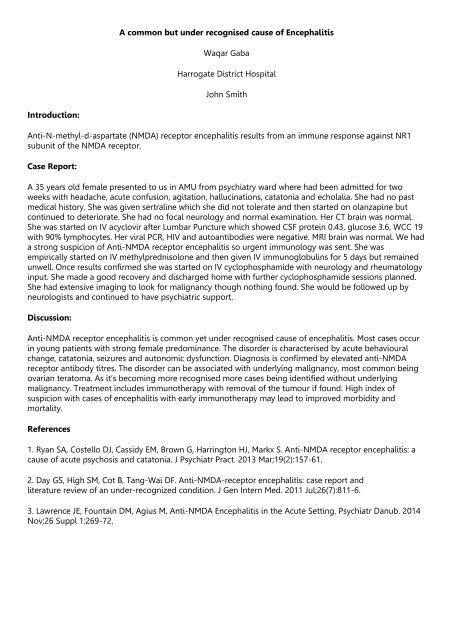Case Report ABSTRACTS
Case-Report-Abstracts
Case-Report-Abstracts
Create successful ePaper yourself
Turn your PDF publications into a flip-book with our unique Google optimized e-Paper software.
A common but under recognised cause of Encephalitis<br />
Waqar Gaba<br />
Harrogate District Hospital<br />
John Smith<br />
Introduction:<br />
Anti-N-methyl-d-aspartate (NMDA) receptor encephalitis results from an immune response against NR1<br />
subunit of the NMDA receptor.<br />
<strong>Case</strong> <strong>Report</strong>:<br />
A 35 years old female presented to us in AMU from psychiatry ward where had been admitted for two<br />
weeks with headache, acute confusion, agitation, hallucinations, catatonia and echolalia. She had no past<br />
medical history. She was given sertraline which she did not tolerate and then started on olanzapine but<br />
continued to deteriorate. She had no focal neurology and normal examination. Her CT brain was normal.<br />
She was started on IV acyclovir after Lumbar Puncture which showed CSF protein 0.43, glucose 3.6, WCC 19<br />
with 90% lymphocytes. Her viral PCR, HIV and autoantibodies were negative. MRI brain was normal. We had<br />
a strong suspicion of Anti-NMDA receptor encephalitis so urgent immunology was sent. She was<br />
empirically started on IV methylprednisolone and then given IV immunoglobulins for 5 days but remained<br />
unwell. Once results confirmed she was started on IV cyclophosphamide with neurology and rheumatology<br />
input. She made a good recovery and discharged home with further cyclophosphamide sessions planned.<br />
She had extensive imaging to look for malignancy though nothing found. She would be followed up by<br />
neurologists and continued to have psychiatric support.<br />
Discussion:<br />
Anti-NMDA receptor encephalitis is common yet under recognised cause of encephalitis. Most cases occur<br />
in young patients with strong female predominance. The disorder is characterised by acute behavioural<br />
change, catatonia, seizures and autonomic dysfunction. Diagnosis is confirmed by elevated anti-NMDA<br />
receptor antibody titres. The disorder can be associated with underlying malignancy, most common being<br />
ovarian teratoma. As it’s becoming more recognised more cases being identified without underlying<br />
malignancy. Treatment includes immunotherapy with removal of the tumour if found. High index of<br />
suspicion with cases of encephalitis with early immunotherapy may lead to improved morbidity and<br />
mortality.<br />
References<br />
1. Ryan SA, Costello DJ, Cassidy EM, Brown G, Harrington HJ, Markx S. Anti-NMDA receptor encephalitis: a<br />
cause of acute psychosis and catatonia. J Psychiatr Pract. 2013 Mar;19(2):157-61.<br />
2. Day GS, High SM, Cot B, Tang-Wai DF. Anti-NMDA-receptor encephalitis: case report and<br />
literature review of an under-recognized condition. J Gen Intern Med. 2011 Jul;26(7):811-6.<br />
3. Lawrence JE, Fountain DM, Agius M. Anti-NMDA Encephalitis in the Acute Setting. Psychiatr Danub. 2014<br />
Nov;26 Suppl 1:269-72.




